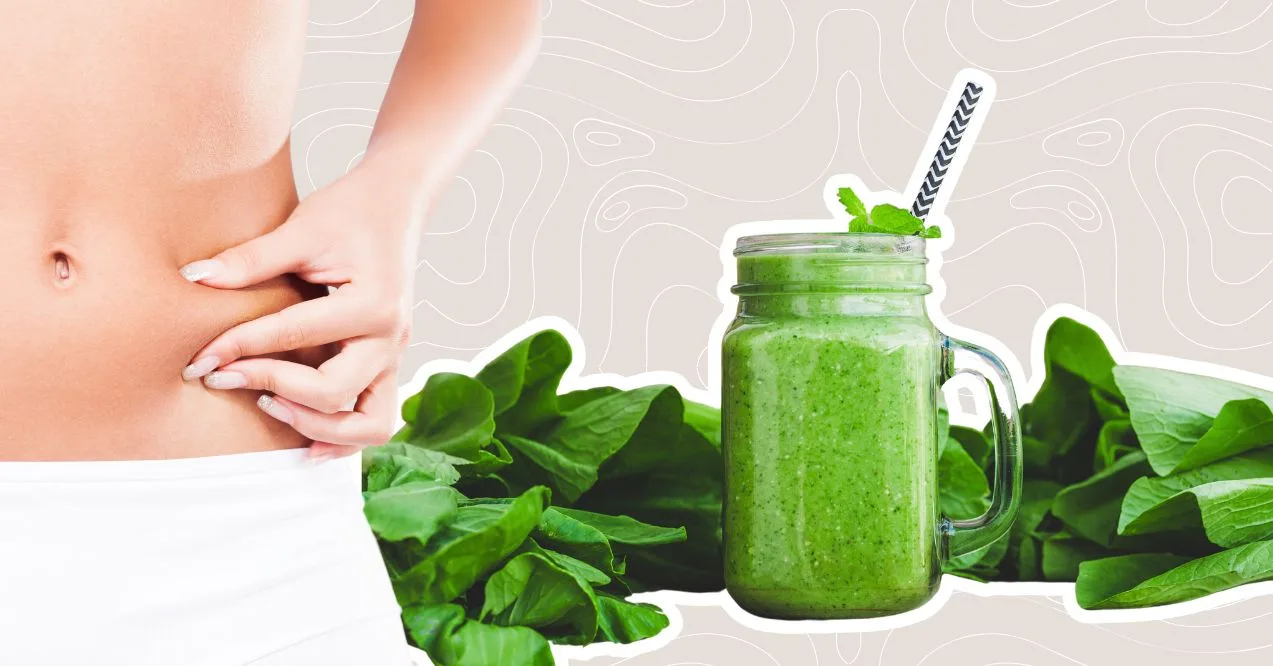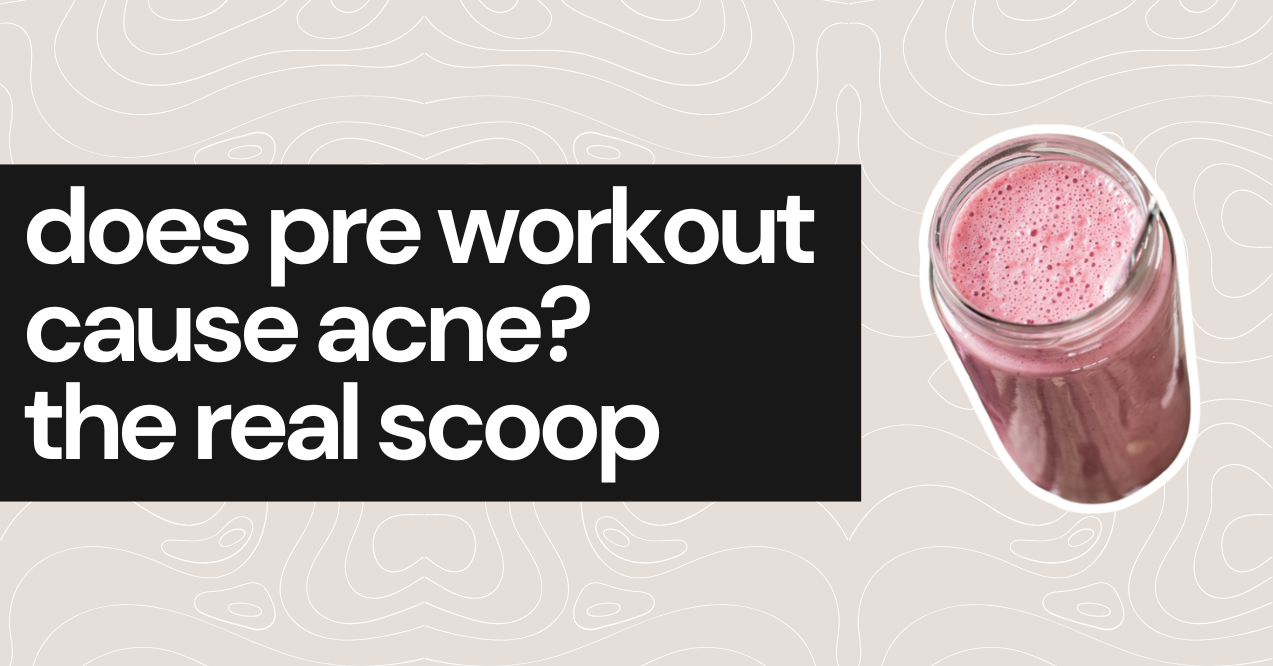nutrition
by trumeta | January 3, 2024
3 Best Smoothies for Brain Fog
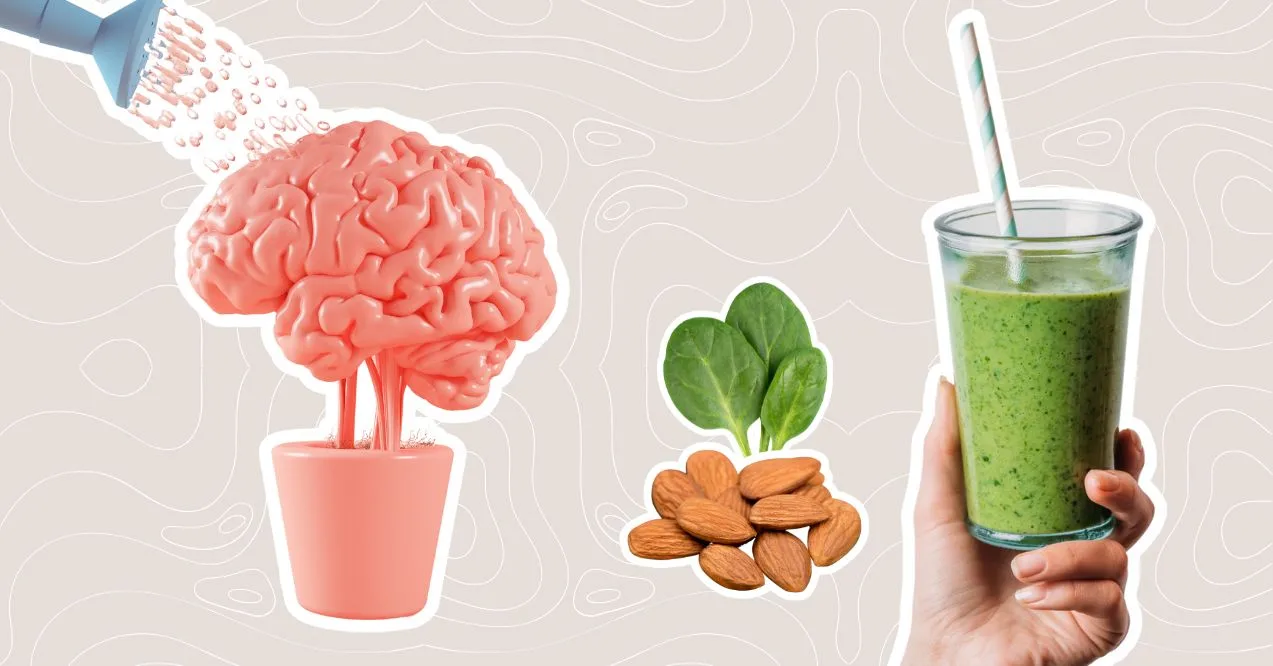
Smoothies for brain fog are a growing trend in the health and wellness community. If you’ve ever struggled to focus at work or find yourself constantly forgetting simple things like where you put your keys, you might be experiencing brain fog. Incorporating nutrient-rich greens for smoothies can be a game-changer in combating this issue.
Brain fog is a symptom characterized by feeling mentally drained and unable to concentrate. It’s important not to confuse it with fatigue[1], which is when you constantly feel exhausted. The main symptoms of brain fog include.
- Difficulty paying attention and processing information that you’d usually have no trouble with
- Fuzzy memory when trying to remember simple things like why you walked into the kitchen, familiar words, or people’s names
- Frequently losing your train of thought
While brain fog is not a health condition, it might be a sign of potential underlying health issues. If left unmanaged, brain fog can interfere with your productivity at work or school.
In this article, you’ll discover:
- The causes of brain fog and how it affects your daily life
- 3 delicious and nutrient-packed smoothie recipes designed to help combat brain fog, including some featuring herbs for mental clarity that are known for enhancing cognitive functions.
- Key ingredients in these smoothies that support brain function and mental clarity
- Tips on how to incorporate these smoothies into your daily routine for optimal results
By the end of this article, you’ll have a better understanding of brain fog and how these specially crafted smoothies can help you regain focus and mental clarity and learn how to get rid of brain fog migraine.
What Causes Brain Fog?
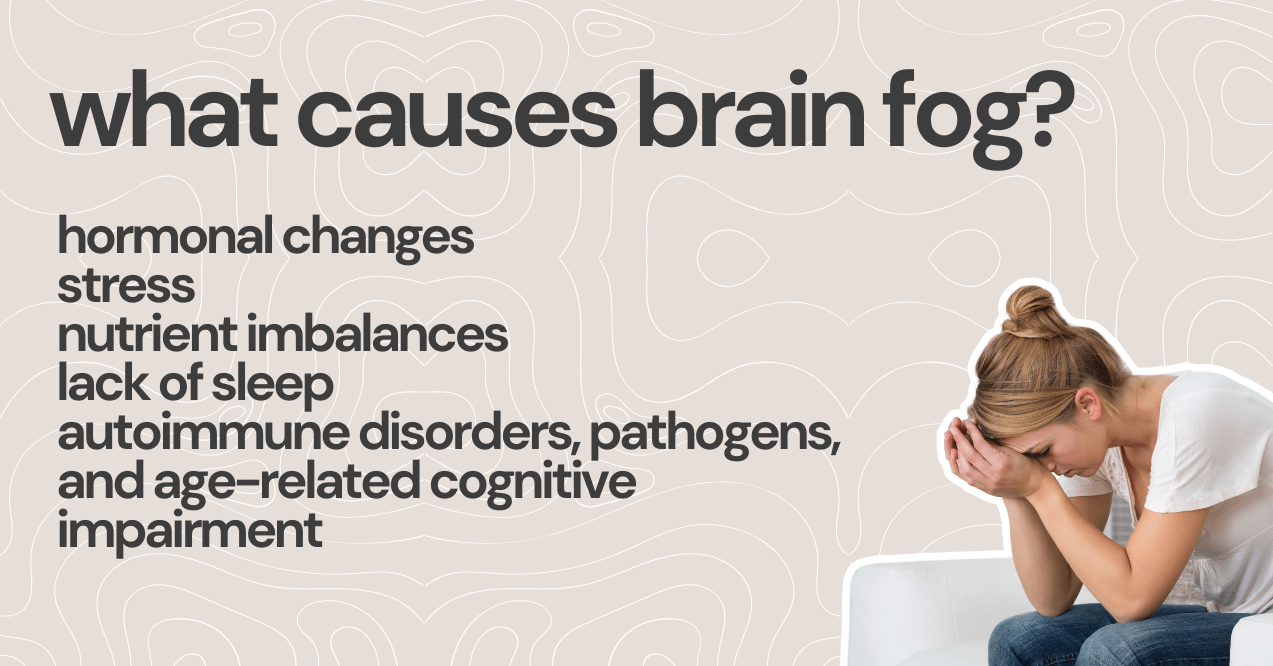
Mental fog is not a comfortable thing to feel by any means. It can appear due to factors such as lack of sleep or high alcohol intake. However, it might also indicate more serious underlying health issues. Below are some of the most common causes of brain fog:
Hormonal Changes
Research shows[2] that hormones take part in many bodily processes, including cognition. Therefore, hormonal changes that happen during pregnancy, menopause, or when you have thyroid disorders[3] can cause forgetfulness, poor concentration, and cloudy thinking.
Stress
Stress leads to exhaustion and hypertension[4]. Consequently, it becomes harder to think, reason, and focus, all symptoms of mental fog.
Nutrient Imbalances
The brain requires vital nutrients such as vitamins B12 and D to perform optimally. When your body is deficient in these nutrients, processing information can become more challenging, leading to brain fog.
Lack of Sleep
As a rule of thumb, as an adult, you should try to get a minimum of 7 hours of sleep each night. While achieving this in today’s fast-paced world may be challenging, poor sleeping habits can significantly affect your productivity due to poor concentration and cloudy thoughts.
Autoimmune Disorders, Pathogens,, and Age-Related Cognitive Impairment
Autoimmune disorders[5] and pathogens are associated with a pro-inflammatory response, which impedes the brain’s normal functioning, leading to mental fatigue and mental fog. Additionally, age-related cognitive impairment[6] can trigger brain fog because as we age, the neurons in our brain decrease in speed, slowing down brain functions as a result.
How to Treat Brain Fog?

How to get rid off brain fog? Mental fog leaves you feeling sluggish and unable to think clearly, which can be a major roadblock to your creativity, productivity, and overall happiness. Therefore, finding effective ways to bust these mental cobwebs is fundamental. Here are some of the best ways to alleviate brain fog.
Balanced Diet
Studies show that the human brain utilizes approximately 20% of the body’s calories, which implies that you must fuel your body with healthy foods for the brain to maintain its operations. Your brain requires beneficial nutrients like antioxidants[7] and omega-3 fatty acids to function optimally.
Eating a balanced diet every day can boost your cognitive performance and reduce the frequency of brain fog episodes. Some of the best foods to incorporate into your diet for brain health include herbs such as rosemary, berries, nuts and seeds, avocados, and oily fish. Also, don’t forget to treat your gut as well with the best smoothies for gut health!
Stay Active
Why not lace up those sneakers, grab a friend or two, and start exploring all the amazing ways you can stay fit and healthy? 30 minutes of physical activity every day, whether through high-intensity training, running, swimming, yoga, or walking, can make a big difference in your health.
While being active will help you get in good shape, research shows that exercise tremendously impacts your cognitive function. Movements such as cardiovascular exercises enhance oxygen and nutrient delivery to the brain, stimulating neurogenesis[8] — the creation of new neurons in the brain. Consequently, this leads to better brain function, reducing brain fog. Research also shows that staying active can help lower the risk of neurodegenerative decline[9], ease depressive symptoms, and maintain hormonal balance, factors that cause brain fog.
Spend More Time Outdoors
Research shows that exposure to nature and green spaces, such as parks and woodlands, can improve cognitive function and alleviate mental fatigue. Additionally, being outdoors allows your body to absorb vitamin D from sunshine, which studies show supports optimal brain function. Therefore, while we are in a very fast-paced world, it’s best to allocate at least 20 minutes each day and bask in nature if you want to break away from mental fog.
Smoothies for Brain Fog
Incorporating smoothies into your daily health regimen is an excellent way to help you consume the amount of fruits and vegetables your body needs, along with extra protein and fiber. But what are the best smoothies for brain health? To come up with the perfect green smoothie for brain fog, you need to blend fruits and vegetables known for boosting brain function. Below are three recipes for the best smoothies for brain fog you can prepare from the comfort of your kitchen!
Berry Bliss Smoothie
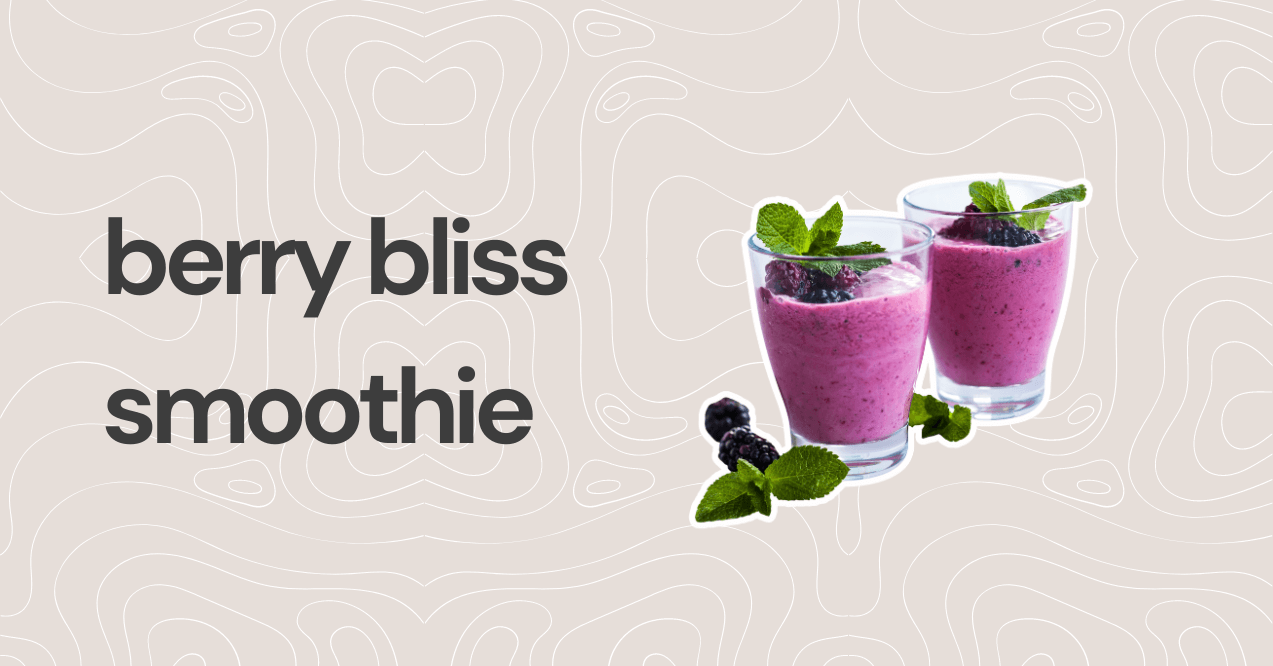
This blend of strawberries, blueberries, chia/hemp seeds, and almond milk is full of antioxidants, vitamins, protein, healthy fats, omegas, minerals and fiber.
Ingredients
- ½ cup frozen strawberries
- ½ cup frozen blueberries
- ½ cup unsweetened Greek yogurt
- 1 tablespoon chia seeds or hemp seeds
- ¼ cup raw almonds
- 1 cup of unsweetened almond milk or 1 cup of milk, rice milk, or purified water
- 2 tablespoon honey (optional)
- ½ cup ice (optional) for a chilled smoothie
Steps for Preparation
- Wash all your produce thoroughly and prepare it for the blender.
- Blend all ingredients starting on low power, working your way up to high until everything is well mixed together, about 45-60 seconds total.
- Add more almond milk, vegetable or carrot juice, or purified water to blend if needed.
- Serve chilled (optional) or as preferred.
Brain Food Smoothie
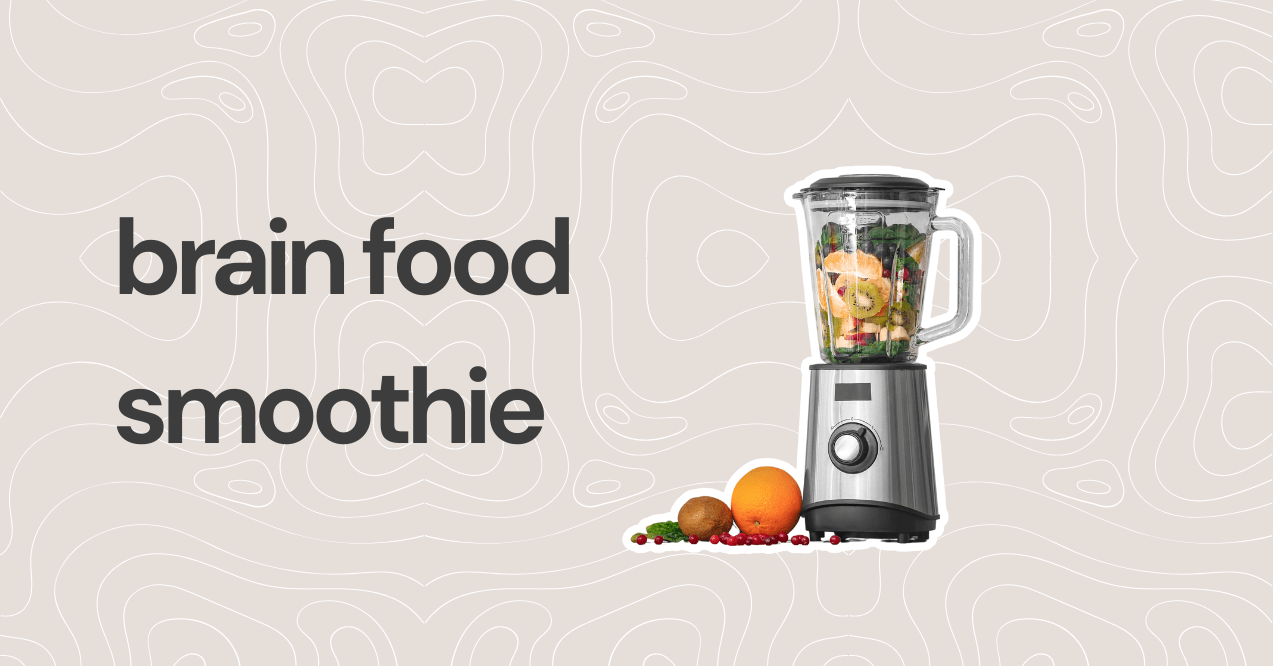
Made from the best brain function-boosting fruits, nuts, and vegetables, this is another of the best smoothies for brain fog. Here is how to prepare it.
Ingredients
- 1-1/2 cups fat-free Greek yogurt
- 1/2 cup of dairy milk (you can substitute with almond milk or rice milk)
- 2 medium ripe avocados, peeled and sliced
- 2 cups halved fresh strawberries
- 1 cup sliced ripe banana
- 1 cup fresh raspberries or frozen unsweetened raspberries, thawed
- 1 cup fresh baby spinach
- 1 cup fresh blueberries
- 1/2 cup fresh or frozen blackberries, thawed
- 1/4 cup unflavored whey protein powder
- 1/4 cup walnuts (high in omega-3 fatty acids)
- ½ cup ice (optional)
- 1 tablespoon chia seeds
Steps for Preparation
- Wash the ingredients that require washing and slice the fruits as preferred.
- Put all ingredients in a blender. Then, blend them until smooth and creamy.
- Feel free to adjust the consistency by adding more almond milk if needed.
- Pour into a glass and garnish with a few whole berries or a sprinkle of chia seeds if you like.
Green Goddess Smoothie
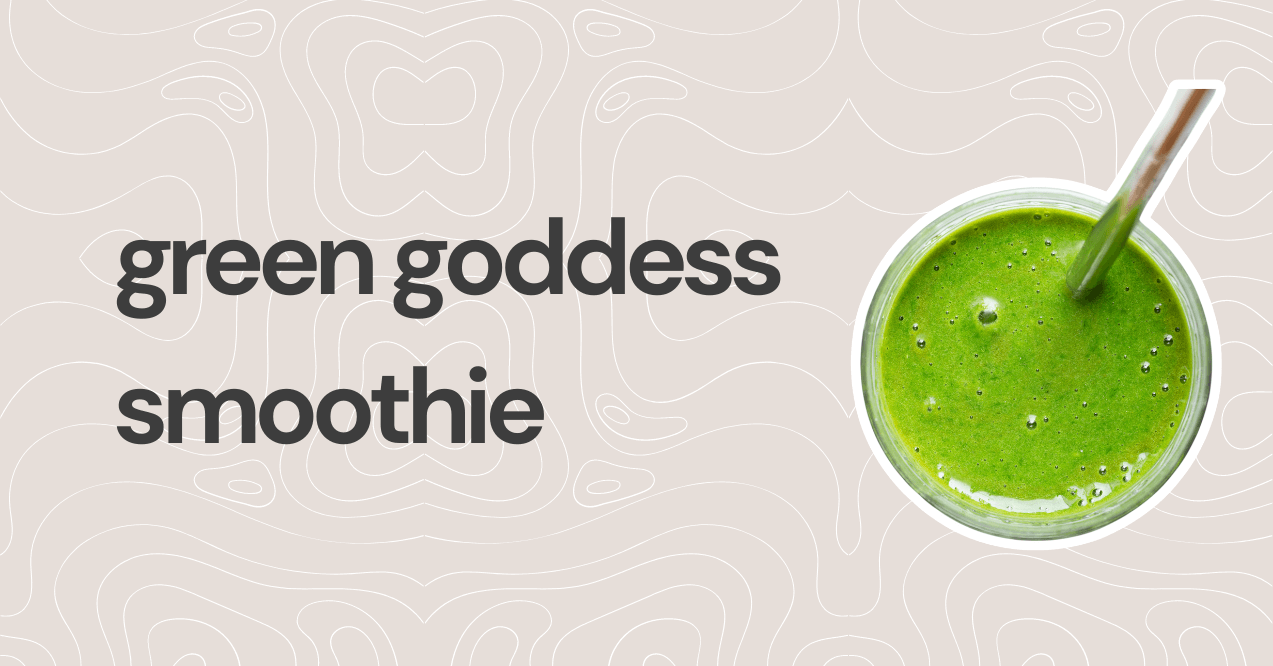
As the name suggests, this green smoothie for brain fog is a delicious blend of vegetables. Drinking it will make you feel like a goddess! Well, almost. Below are the steps to prepare it.
Ingredients
- 2 cups baby spinach (about two large handfuls)
- 1/2 cup pineapple chunks (adds sweetness and vitamin C)
- ½ cup sliced beetroots
- 4-5 large leaves of romaine lettuce
- 2 small pears chopped (you can substitute with two apples, too)
- 1 small ripe banana, peeled and diced
- 1/2 avocado
- 1/2 cucumber (hydrating and adds a fresh taste)
- 2 tablespoons ground flax seeds or chia seeds
- ½ teaspoon turmeric
- 1 cup coconut water or 1 cup unsweetened vegetable or carrot juice
- 1 cup ice (about 10 ice cubes)
Steps for Preparation
- Clean the ingredients.
- Combine all the ingredients in a blender.
- Blend until smooth, adjusting the consistency with more coconut water or unsweetened vegetable juice if needed.
- Pour into a glass and enjoy your Green Goddess Smoothie!
Note: It is important to note that taking smoothies won’t miraculously banish brain fog instantly. However, incorporating them into your routine in a consistent manner can lead to gradual improvements. These nutrient-rich blends support cognitive function, promoting clarity and alleviating brain fog over time.
Interested in more recipes? You might like our other recommendations:
- Acai Smoothie Recipe
- Mixed Berry Smoothie Recipe Without Yogurt
- Mushroom Coffee Smoothie Recipe
- Reds Smoothie Recipe
- Best Beet Smoothie Recipe for Fast Metabolism
Boost Your Smoothies’ Brain Fog Busting Potency by Adding a Dietary Supplement
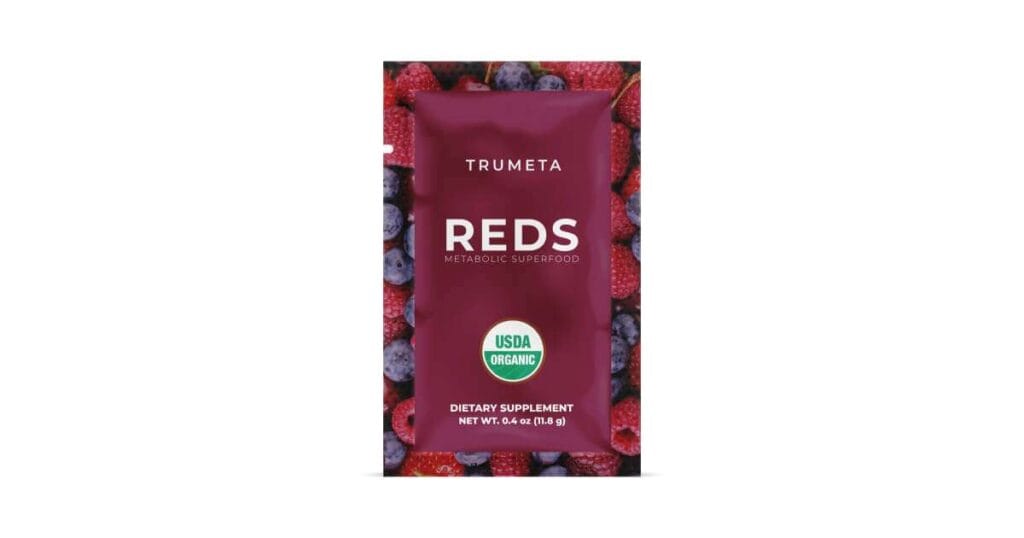
As an extra ingredient, you can add a dietary supplement to your smoothies to take them to the next level and turn them into powerhouses to reduce brain fog. One of the best nutritional supplements to incorporate in the abovementioned recipes is Metabolic Reds by Trumeta.
This powerful blend of over 25 organic red fruits and vegetables is ideal for combatting brain fog and promoting stronger memory. It contains organic ingredients, including strawberries, blueberries, cranberries, lion’s mane, and organic green tea, which contain fiber, antioxidant properties, and vitamins C and K, which are excellent for optimizing brain health.
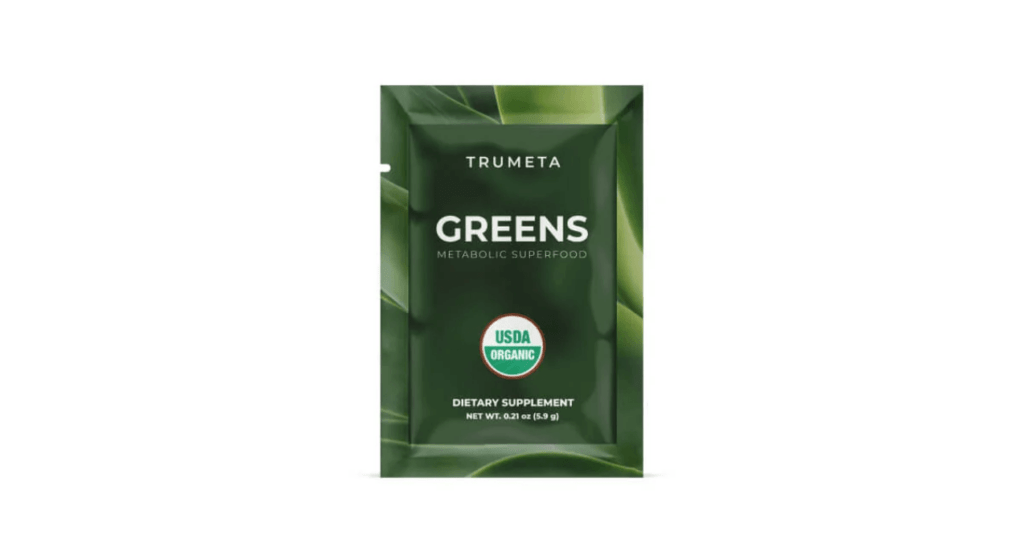
Alternatively, you can choose Metabolic Greens, a blend of rejuvenating organic greens, including kale, barley grass, broccoli, wheat grass, spirulina, goji berry, acai berry, and maca root. The ingredients contained in this nutritional supplement recharge your metabolism and energy levels and promote healthy digestion, thus lowering gut issues, which are closely associated with brain fog.
Add a scoop of Trumeta’s Metabolic Reds or Metabolic Greens into your smoothie as you blend for an extra sizzle of nutrients and flavor. The best part about these two dietary supplements is that they are vegan, gluten-free, dairy-free, non-GMO, soy-free, nut-free, shell-fish-free, and sesame-free, making them suitable for everyone.
Trumeta makes these products only from USDA-certified organic ingredients, which is a testament to their high quality. Metabolic Reds and Greens are suitable for adults of all ages, and you should use them consistently for best results. So, if you’re looking for a kick to help you dispel that brain fog, this is it!
Food for Brain Fog
Now that you know the best smoothies for brain health, let’s look at the foods that can alleviate brain fog and their nutritional values. Are you ready to boost your brain power and say goodbye to brain fog? Get ready to discover the ultimate brain-friendly diet with the options below!
Fatty Fish
Research shows that about 60% of your brain consists of fat, half of which comprises omega-3 fatty acids, a compound used by the brain to build brain cells and nerve cells essential for learning and memory. Fish such as sardines, herring, salmon, and trout are excellent sources of omega-3 fatty acids. Incorporating them in your meals can be a great way to promote brain health and shun brain fog.
Avocado
Avocados are a powerhouse of nutrition! Packed with healthy fats and vital vitamins B, C, and E, they are the ultimate brain-boosting food. These incredible nutrients all work together to enhance mental clarity and reduce brain fog, making avocados an exciting addition to any diet aimed at unlocking your full cognitive potential.
Green Leafy Vegetables
Did you know that incorporating veggies like spinach, kale, and Swiss chard into your diet can help boost cognitive function? That’s because they contain lots of vitamins A, B, and C, all of them essential for keeping your brain sharp and focused. They are also rich in antioxidants that can help protect the brain from free radical damage and pro-inflammatory responses, making them perfect choices for combating brain fog.
Berries
Berries, especially raspberries, cranberries, strawberries, and blueberries, are packed with antioxidants and vitamins C and K, which studies suggest improve memory and cognitive function. Adding them to your smoothies is a surefire way to lower the chances of brain fog.
Nuts
Nuts contain vital nutrients such as healthy fats, antioxidants, and vitamin E, which explains their beneficial effects on brain health. Some of the best nuts are walnuts, almonds, hazelnuts, and cashews. While all nuts are good for your brain, walnuts are superior since they contain high amounts of omega-3 fatty acids that can help alleviate brain fog.
Key Takeaways
Brain fog is when you have difficulty concentrating, have a fuzzy memory, and feel like your mind is constantly clouded. This state can hamper your productivity and lower the quality of your life. It is not a health disorder, but other symptoms within the body can trigger it. Some of the common causes of mental fog include:
- Lack of sleep
- Hormonal changes
- High alcohol intake
- Stress
- Nutrient imbalances
- Autoimmune disorders, pathogens, and age-related cognitive impairment
One of the best approaches to banish mental fog is by integrating smoothies into your daily health and wellness regimen. Green Goddess Smoothie, Brain Food Smoothie, and Berry Bliss Smoothie are among the best options at your disposal to boost your mental health.
These smoothies are not an instant solution, but if you take them consistently, you’ll soon start to notice a positive change in your brain health. Other ways to enhance mental clarity are having a balanced diet, staying active, and spending more time outdoors.
FAQs
The best way to alleviate brain fog is through lifestyle changes, including having a balanced diet, getting enough sleep, moving your body more through running, walking, yoga, etc., and spending more time outdoors. Taking smoothies for brain fog can also help combat mental fog. They should contain green leafy vegetables, nuts, and berries with cognitive-boosting properties for great results.
The best foods for brain fog include fatty fish such as sardines, herring, salmon, trout, avocados, nuts (including walnuts, almonds, hazelnuts, and cashews), and berries, especially raspberries and blueberries. Other useful foods to help dispel brain fog include beetroots, broccoli, beans, eggs, turmeric, green tea, pumpkin seeds, and dark chocolate. These foods are rich in nutrients such as healthy fats and vitamins B, C, E, and K, which are great for boosting cognitive function.
References:
[1] Healthdirect Australia. (2022, July 14). Fatigue. Healthdirect. https://www.healthdirect.gov.au/fatigue
[2] Ali, S. A., Begum, T., & Reza, F. (2018). Hormonal influences on cognitive function. The Malaysian Journal of Medical Science, 25(4), 31–41. https://doi.org/10.21315/mjms2018.25.4.3
[3] Van Vliet, N. A., et al. (2021). Association of thyroid dysfunction with cognitive function. JAMA Internal Medicine, 181(11), 1440. https://doi.org/10.1001/jamainternmed.2021.5078
[4] World Health Organization: WHO. (2019, June 20). Hypertension. https://www.who.int/health-topics/hypertension/#tab=tab_1
[5] Lim, L. S. H., et al. (2013). Effect of auto-immune diseases on cognitive function. In Handbook of Clinical Neurology (pp. 1275–1283). https://doi.org/10.1016/b978-0-444-52910-7.00050-7
[6] Murman, D. L. (2015). The impact of age on cognition. Seminars in Hearing, 36(03), 111–121. https://doi.org/10.1055/s-0035-1555115
[7] Lee, B. H., & Cha, M. (2020). Neuroprotective effect of antioxidants in the brain. International Journal of Molecular Sciences, 21(19), 7152. https://doi.org/10.3390/ijms21197152
[8] Spalding, K. L., et al. (2013). Dynamics of hippocampal neurogenesis in adult humans. Cell, 153(6), 1219–1227. https://doi.org/10.1016/j.cell.2013.05.002
[9] Professional, C. C. M. (n.d.). Neurodegenerative diseases. Cleveland Clinic. https://my.clevelandclinic.org/health/diseases/24976-neurodegenerative-diseases
Advertisement. This site offers health, wellness, fitness and nutritional information and is designed for educational purposes only. You should not rely on this information as a substitute for professional medical advice, diagnosis, or treatment. If you have any concerns or questions about your health, you should always consult with a physician or other health-care professional. Do not disregard, avoid or delay obtaining medical or health related advice from your health-care professional because of something you May have read on this site. The use of any information provided on this site is solely at your own risk.
Popular Posts
Recent Posts
Does Creatine Expire and Lose Its Effectiveness?
July 17, 2024
Should You Take Pre Workout Before Running?
July 11, 2024
What Are the Best Herbs for Muscle Recovery?
June 27, 2024
Can You Drink Protein Shakes Without Working Out?
June 20, 2024

